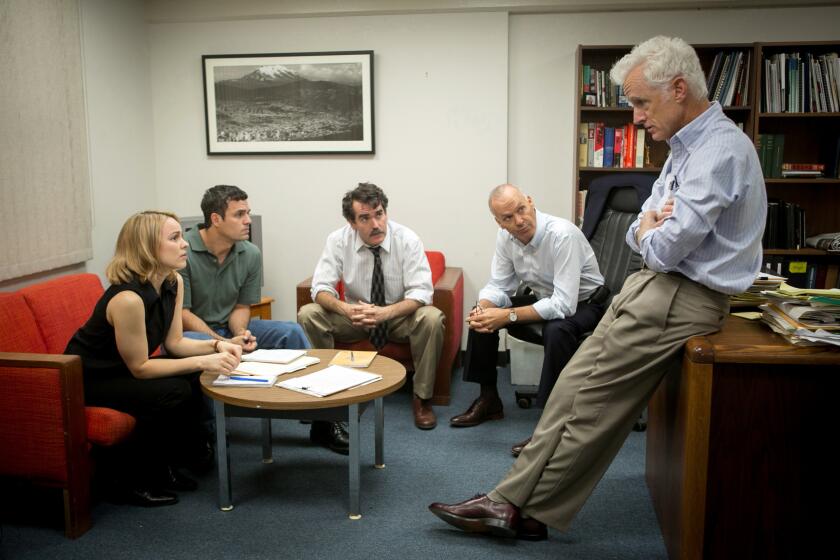Bargaining at a tilted table
WHILE President Bush points to low unemployment and a resurgent stock market as signs of a strong economy, most Americans don’t feel so bullish. Median incomes are flat, healthcare costs are soaring, pensions are being de-funded and corporate employers are threatening to shred the social contract with their employees that has prevailed for 60 years.
The balance of economic power has become increasingly one-sided, and one reason is that a key institution -- the National Labor Relations Board, the country’s chief arbiter of labor disputes -- remains solidly in anti-worker hands. Although a quasi-judicial entity appointed by the president and empowered to adjudicate labor disputes, the NLRB actually sets the rules that govern those disputes and thereby exerts an enormous influence over who prevails. In case after case, the Republican-dominated board has taken positions that have hurt American workers.
In one recent case, the Oakwood Healthcare decision, the board found (by its usual 3-2 Republican majority) that a group of Michigan nurses are excluded from the protection of the nation’s most important labor laws on the spurious grounds that they are “supervisors,” not employees. In one stroke, these workers -- and potentially tens of thousands of others -- lost the right to be in a union and to advocate collectively for workplace improvements.
The same day as the Oakwood decision in late September, the board also cut back on the right of employees to wear union buttons at work. That case arose out of a dispute in San Diego at the W Hotel, which, according to its owner, the Starwood Hotels & Resorts chain, seeks to give its guests a “wonderland” hotel experience where they get “whatever they want, whenever they want it.” For its employees, however -- mostly low-paid Latino laborers -- the hotel is no wonderland. Some wore buttons bearing four words -- “Justice Now! Justicia Ahora!” -- and the name of their union. The W demanded workers take them off.
The NLRB sided with the W because the buttons were “controversial.” W guests now need not worry about having their wonderland experience marred by seeing employees exercise their 1st Amendment rights. That rule is now precedent and can be applied to workers in labor disputes across the country.
But what happened in San Diego is nothing compared to what happened to workers in Jacksonville, Texas, just the day before. Back in 2000, the employees of a small meat-cutting department at a Jacksonville Wal-Mart voted to unionize. A week later, Wal-Mart announced that it was phasing out in-store meat-cutting departments nationwide. It took six years for the NLRB to conclude that Wal-Mart had unlawfully retaliated against workers trying to unionize. Even then, the board disregarded the ruling of its own administrative law judge and decided that, even though Wal-Mart violated the law, it can’t be ordered to restore the unionized meat department.
These are just the latest among dozens of anti-worker NLRB decisions in recent years. The cumulative effect has been devastating, particularly in a global economy in which workers’ rights are being eroded in the face of lowest-common-denominator labor conditions in places such as China and India.
A nationwide study by the University of Illinois at Chicago found that:
* 30% of employers fire pro-union workers.
* 49% threaten to close a work site when workers try to unionize.
* 82% hire consultants to fight union-organizing drives.
* 91% force employees to attend anti-union meetings with supervisors.
“Our research clearly shows that firings, bribes and threats are pervasive,” said Nik Theodore, director of the university’s Center for Urban Economic Development. “These actions greatly impede workers’ ability to form unions.”
In 1935, when Congress enacted the National Labor Relations Act, it held the philosophy that protecting the right to organize helped to restore “equality of bargaining power between employers and employees” and even to remove “sources of industrial strife” and to “safeguard commerce” from injury. Congress clearly saw workers’ rights as good for the overall economy. Today, however, the Republican-dominated and anti-worker NLRB is motivated by a much different philosophy.
Congress could begin rectifying the situation by passing the Employee Free Choice Act, which already has 215 co-sponsors in the House and 43 in the Senate, perhaps more once Democrats take control of Congress in January. The act would make it less difficult to form a union and authorize stronger penalties for retaliation against workers seeking to unionize.
Democratic congressional leaders need to recognize that many hardworking Americans haven’t received their fair share of the recent economic recovery. It’s time to change the rules so that the economy works for all of us instead of some of us.






